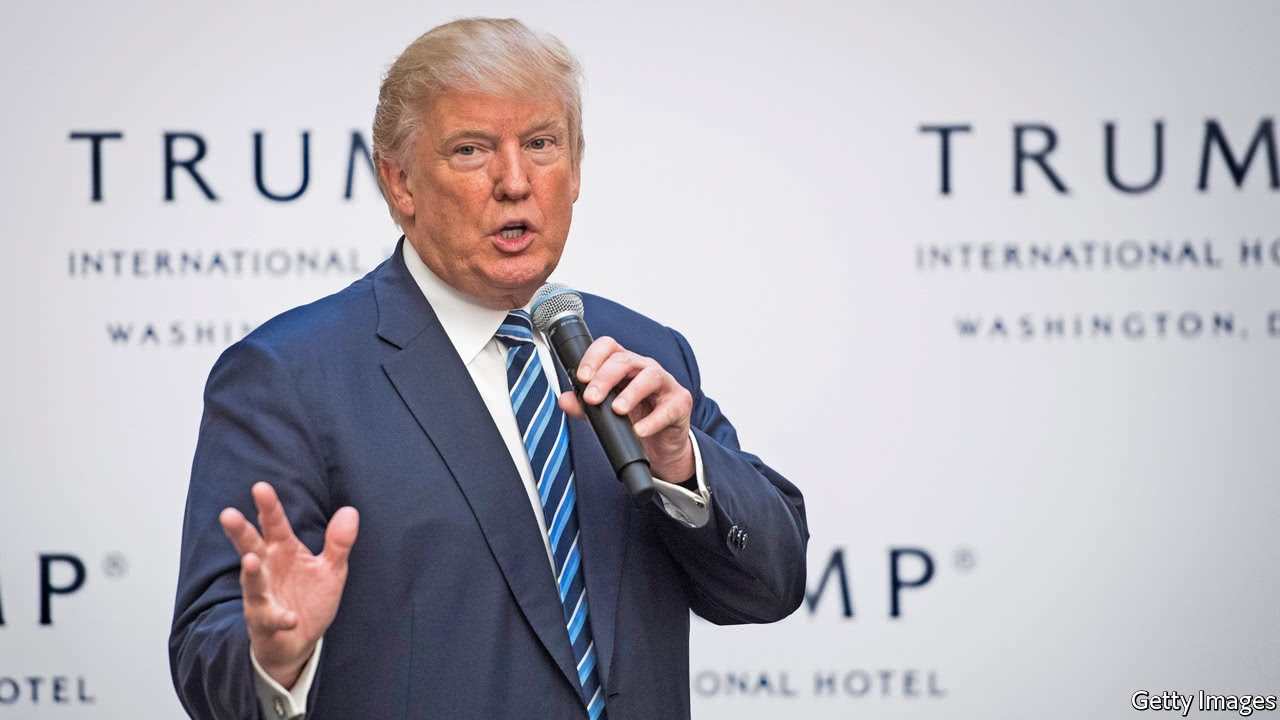
CHOOSING a hotel for a trip is generally seen as an apolitical decision. In contrast, restaurants and cafes have sometimes taken on an ideological tinge, with conservatives mocking liberals for their latte coffees, and liberals ribbing conservatives for their deep-fried everything and well-done steaks. But for most hotel users, location and good Wi-Fi matter more than the ideology of the owners. In some places that now appears to be changing: a trend turbocharged since the arrival of Donald Trump, an owner of an international hotel brand, in politics.
Suddenly the new Trump International Hotel in Washington, DC—on the same street as the White House and Capitol building—became the most politically-charged building in the city, if not the country. Celebrity chefs scrapped their plans to open restaurants there after Mr Trump made incendiary comments about Mexicans. Meanwhile, organisations such as the Kuwaiti embassy felt political pressure to move their events from rival hotels to the Trump building, to curry the new president’s favour.
-
An unexpected result moves Chile into uncharted political territory
-
America’s culture wars are spreading to hotels
-
Marriage longevity in Britain is nearly back to 1970s levels
-
Africans are getting healthier and wealthier…
-
Italy’s World Cup exit is far from an apocalypse
-
How the world changed around Sergio Aragones and Mad magazine
Last week the politics of hospitality got further amplified with the announcement that a new anti-Trump hotel will open its doors in Washington DC. The 209-room Eaton Workshop, set to open next spring just six blocks from the Trump hotel, is branding itself as a progressive haven for the anti-Trump set. The description on its website could be mistaken for a conservative parody of urban liberalism, promising to “set the stage for residing guests, locals and house members to congregate around creativity and consciousness-building.” The hotel will offer an arts programme, a progressive lecture series, and a “radical approach to food and beverage.” The firm plans to add a Hong Kong hotel next year, followed by outposts in San Francisco and Seattle.
Catering specifically to a liberal clientele in big cities is probably a savvy business move. Cosmopolitan urbanites tend to have plenty of spare cash to splash out travelling. And conservatives are few in number in these places. Just 4% of voters in Washington, DC, 9% in San Francisco, and 10% in Manhattan in New York voted for Mr Trump. And going against this urban grain is costly in the travel business. When New York taxi drivers boycotted the city’s John F. Kennedy Airport in January to protest against Mr Trump’s ban on travellers from seven majority-Muslim countries, Uber, a ride-hailing app, sensed a business opportunity and dropped its surge pricing so that rides from the airport would be cheaper. But Lyft, a rival app, sensed a different sort of opportunity and announced a $1m donation to the American Civil Liberties Union, an outfit which opposed the ban. That resulted in Uber reportedly losing 200,000 users, while its rival Lyft attracted many of the progressive former Uber users away. Since then its market share has continued to climb steadily in the city and across America.
Mr Trump’s hotel in Washington, DC may have also profited from its attraction to conservatives. Before it opened, the Trump Organisation expected it to lose $2m in the first four months of 2017, as it worked to establish its clientele. Instead, in August it revealed a profit of $2m for the same period. Whether it can continue to make money is another question, however. One analysis published today by the Daily Telegraph suggests that the price of a two-night stay in Mr Trump’s Washington hotel will cost 52% less in January 2018 than it did the same month a year before, when his inauguration was held in the city. Yet the hotel does not need to appeal to everyone. It just has to attract enough people to fill its rooms and event spaces. Mr Trump’s 63m voters—plus American and foreign entities seeking to curry favour with his administration—may more than suffice.
Source: economist
America’s culture wars are spreading to hotels